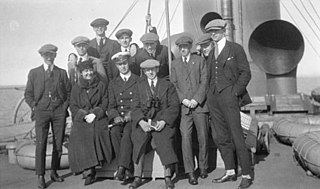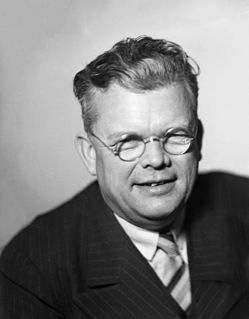
The 1912 Summer Olympics, officially known as the Games of the V Olympiad and commonly known as Stockholm 1912, were an international multi-sport event held in Stockholm, Sweden, between 5 May and 22 July 1912.

The men's ice hockey tournament at the 1924 Winter Olympics in Chamonix, France, was the 2nd Olympic Championship, also serving as the 2nd World Championships. The competition was held from Monday, January 28, 1924, to Sunday, February 3, 1924. Canada, represented by the Toronto Granites, defended its championship from the 1920 Summer Olympics. The United States and Great Britain took the silver and bronze respectively, while other contenders included Czechoslovakia, France, and Sweden.

Ice hockey was introduced to the Olympic Games at the 1920 Summer Olympics in Antwerp. The tournament also served as the 1st World Championships. The matches were played between April 23 and April 29, 1920. Canada, represented by the Winnipeg Falcons, won the gold medal. The silver went to the United States and Czechoslovakia took the bronze.

France competed at the 1928 Summer Olympics in Amsterdam, Netherlands. 255 competitors, 219 men and 36 women, took part in 112 events in 17 sports. At the beginning of the games there was an incident where a French coach was physically assaulted by a Stadium gatekeeper who refused him entry. It boiled over to a point where the entire French team did not participate in the Parade of Nations, and conversations were made to pull out of the games completely. However, the issue was resolved and France went on to compete.

France competed at the 1920 Summer Olympics in Antwerp, Belgium. 304 competitors, 296 men and 8 women, took part in 113 events in 23 sports.

Great Britain, represented by the British Olympic Association (BOA), competed at the 1920 Summer Olympics in Antwerp, Belgium. 234 competitors, 218 men and 16 women, took part in 84 events in 21 sports. British athletes won fourteen gold medals and 43 medals overall, finishing third. It would be the last Olympic Games in which Irish athletes participated under Great Britain, after foundation of Irish Free State in 1922.

Great Britain, represented by the British Olympic Association (BOA), competed at the 1924 Summer Olympics in Paris, France. Despite the name, athletes from the newly independent Irish Free State competed separately. Following the Royal and Parliamentary Titles Act 1927, the name changed (officially) to 'United Kingdom of Great Britain and Northern Ireland' but the Olympic team competed as Great Britain from the 1928 games onwards. 267 competitors, 239 men and 28 women, took part in 115 events in 18 sports.

Sweden competed at the 1920 Summer Olympics in Antwerp, Belgium. 260 competitors, 247 men and 13 women, took part in 100 events in 18 sports.

The United States competed at the 1920 Summer Olympics in Antwerp, Belgium. 288 competitors, 274 men and 14 women, took part in 113 events in 18 sports.

Austria competed at the 1912 Summer Olympics in Stockholm, Sweden. Austrian and Hungarian results at early Olympic Games are generally kept separate despite the union of the two nations as Austria-Hungary at the time. 85 competitors, 76 men and 6 women, took part in 46 events in 12 sports.

Italy competed at the 1920 Summer Olympics in Antwerp, Belgium. 174 competitors, 173 men and 1 woman, took part in 79 events in 18 sports.

Switzerland competed at the 1920 Summer Olympics in Antwerp, Belgium. 77 competitors, all men, took part in 45 events in 13 sports.

Czechoslovakia competed at the 1920 Summer Olympics in Antwerp, Belgium. It was the first time that the nation had competed at the Summer Olympic Games, after the republic was founded in 1918. Previously, Bohemia had competed at the Olympic Games from 1900 to 1912.

The Netherlands competed at the 1920 Summer Olympics in Antwerp, Belgium. 130 competitors, 129 men and 1 woman, took part in 58 events in 15 sports.

Belgium competed at the 1912 Summer Olympics in Stockholm, Sweden.

Belgium was the host nation for the 1920 Summer Olympics in Antwerp. 336 competitors, 326 men and 10 women, took part in 121 events in 23 sports.

Greece competed at the 1920 Summer Olympics in Antwerp, Belgium. 47 competitors, all men, took part in 34 events in 8 sports. Greek athletes have competed in every Summer Olympic Games.

Spain competed at the 1920 Summer Olympics in Antwerp, Belgium. It was only the second appearance of the nation at the Summer Games, after competing in the 1900 Summer Olympics, but missing the Games in 1904, 1908, and 1912. 58 competitors, all men, took part in 29 events in 7 sports.
The 1912 Summer Olympics in Stockholm saw the fourth water polo tournament at Olympics. All games took place in the newly built swimming stadium in Djurgårdsbrunnsviken from 7 to 16 July 1912. All medals were decided by using the Bergvall system.

Erik Gustaf Bergvall was a Swedish water polo player, journalist and sports official. He also promoted the Bergvall system, a variation of the traditional knockout tournament system which was used at the 1912, 1920 and 1924 Summer Olympics.















